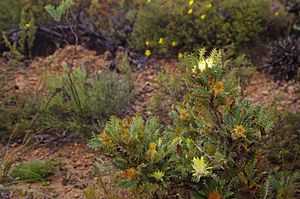Banksia armata var. armata facts for kids
Quick facts for kids Banksia armata var. armata |
|
|---|---|
 |
|
| Habit in the Beelu National Park | |
| Scientific classification |
|
| Kingdom: | Plantae |
| Clade: | Tracheophytes |
| Clade: | Angiosperms |
| Clade: | Eudicots |
| Order: | Proteales |
| Family: | Proteaceae |
| Genus: | Banksia |
| Species: | |
| Varietas: |
B. a. var. armata
|
| Trinomial name | |
| Banksia armata var. armata |
|
| Synonyms | |
Banksia armata var. armata is a type of shrub found only in Western Australia. It's special because it has a thick, woody base called a lignotuber. This helps it grow back after a fire. This plant also has narrower leaves with more pointy edges and smaller flowers compared to its close relative, Banksia armata var. ignicida. It's usually a shorter plant too.
Contents
What Does It Look Like?
This `Banksia` plant is a shrub that usually grows up to about 1.5 meters (5 feet) tall. It has a special woody base called a lignotuber. This base helps the plant survive and regrow, especially after bushfires.
Leaves and Flowers
Its leaves are about 2 to 8 centimeters (0.8 to 3 inches) long and 8 to 20 millimeters (0.3 to 0.8 inches) wide. They have deep, saw-like edges with 6 to 13 sharp, triangular points on each side. The flowers are yellow and about 2.5 to 3.2 centimeters (1 to 1.3 inches) long. The part of the flower that receives pollen, called the pistil, is about 2.8 to 3.9 centimeters (1.1 to 1.5 inches) long.
How It Got Its Name
The first samples of Banksia armata were collected in December 1801. This happened at King George Sound by a botanist named Robert Brown. Brown wrote about the plant in 1810. He named it Dryandra armata.
Meaning of the Name
The name armata comes from a Latin word meaning "armed." This name was chosen because of the plant's sharply serrated, or "armed," leaves.
Changes Over Time
Later, in 1996, another variety of this plant was named. This led to the original plant being called Dryandra armata var. armata. In 2007, scientists decided to move all Dryandra species, including this one, into the Banksia group. This change was accepted by the Australian Plant Census.
Where It Grows
This variety of `Banksia` is found widely in the south-west part of Western Australia. You can mostly find it between Mount Lesueur, Walpole, and the Cape Arid National Park. It often grows in open woodlands and areas with low, scrubby plants called kwongan. It prefers rocky soils.
Conservation Status
The Western Australian Government's Department of Parks and Wildlife says that this variety of Banksia armata is "not threatened." This means it is not currently at risk of disappearing.
 | Delilah Pierce |
 | Gordon Parks |
 | Augusta Savage |
 | Charles Ethan Porter |

